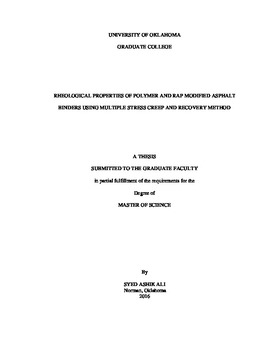| dc.description.abstract | In recent years, asphalt modifications have become increasingly popular in asphalt pavement construction. Also, in view of technical, environmental and economic benefits, the pavement industry is in favor of using high amounts of Reclaimed Asphalt Pavement (RAP) in asphalt mixes for pavement construction. Consequently, accurate rheological characterization of asphalt binders containing polymer modifiers and RAP binder is important because pavement performance is largely influenced by asphalt binder properties.
A number of test methods have evolved over the last three decades for evaluating the rutting susceptibility of asphalt binders. The objective of the current study was to use a simple Dynamic Shear Rheometer-based (DSR) test method as an alternative to the Superpave® Performance Grade (PG) tests or “PG plus” tests to accurately evaluate high-temperature performance of asphalt binders. To achieve this objective, the rheological characteristics of asphalt binders were evaluated using the Multiple Stress Creep and Recovery (MSCR) and Superpave® test methods. For this purpose, polymer-modified binders were collected from different sources located in Oklahoma, New Mexico and Texas. Also, binders were extracted from two RAPs and blended with a commonly used PG 64-22 binder at selected rates, namely 0%, 25%, 40% and 60% by the weight of the binder. Furthermore, four different asphalt mixes containing polymer-modified binders and different amounts of RAP were tested for rutting performance in the laboratory. The rutting parameter (|G*|/sinδ), fatigue parameter (|G*|.sinδ), viscosity, high- and low-temperature PG grades of all modified and unmodified binders were evaluated based on the Superpave® test methods. The MSCR tests were conducted to determine high-temperature MSCR grades and to evaluate the effects of the addition of polymer and RAP binder on non-recoverable creep compliance (Jnr) and %Recovery values of the binders.
The polymer-modified binders were found to meet the Superpave® specifications and exhibited satisfactory rutting and fatigue resistance. The high- and low-temperature PG grades of the RAP binder blends were observed to increase with an increase in the RAP binder content. From the MSCR test results, the minimum %Recovery requirement based on the Jnr criteria suggested in AASHTO TP 70 was found to be appropriate for differentiating polymer-modified binders from non-polymer modified binders. Also, the addition of a higher stress level, such as 10 kPa to the MSCR test method, was found to help understand the nonlinear viscoelastic behavior of the polymer-modified binders. Furthermore, the Jnr value decreased and MSCR grades increased with an increase in the amount of RAP binder, which indicated an improved resistance to rutting for the RAP binder blends. The rutting and moisture susceptibilities of the asphalt mixes with high RAP content were found to be satisfactory from Hamburg Wheel Tracking (HWT) tests. A comparison of the Superpave®, MSCR and HWT test results is also presented in the present study. | en_US |
